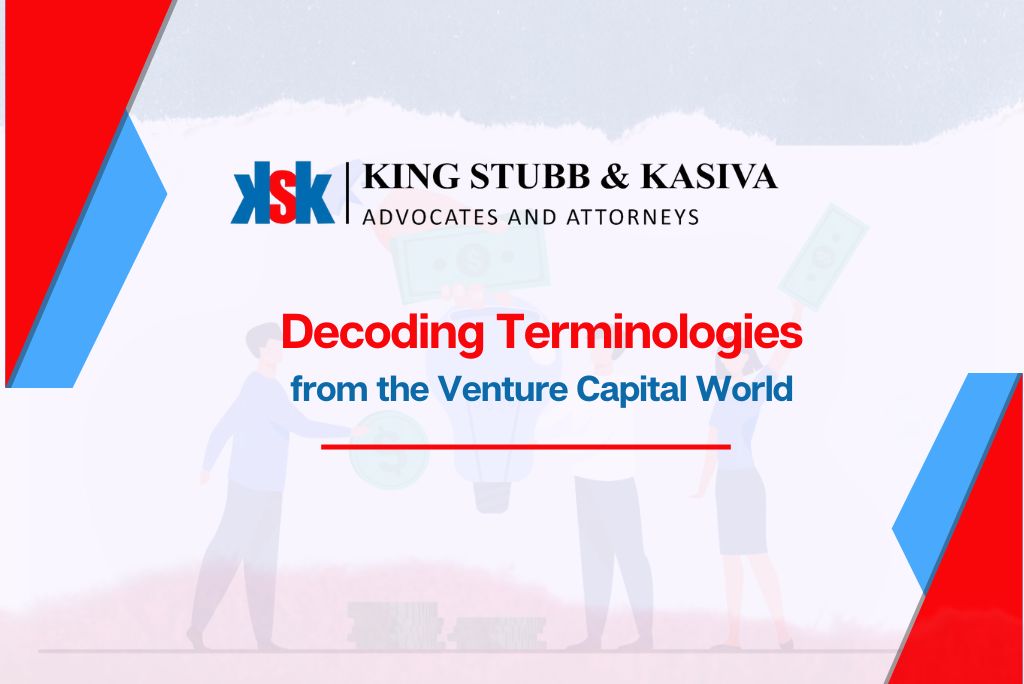Venture Capital (“VC”) is a form of equity financing that provides capital to start-ups and high-growth businesses. Entrepreneurs and investors need to understand the terms used in Venture Capital transactions and the legally binding transaction agreements outlining buying, selling, investing, or lending. The list of terminologies in this article is not exhaustive but serves to be an initial step for those looking to delve deeper into the language used in Venture Capital transactions.
- Affirmative Voting Rights: give investors the right to vote on vital matters, such as the election of directors or other major transactions.
- Anti-Dilution: this is a provision that protects the investors from dilution of their share holding percentage in the event of a subsequent financing round.
- Bridge Round: this is a type of financing used by companies to bridge the gap between their current funding and their next round of financing. A bridge round provides a company with a quick influx of cash to continue operations while it works to secure a more significant round of funding.
- Conditions Precedent and Conditions Subsequent: these are conditions that must be met by the investors and/or promoters before and after a VC transaction is completed.
- Convertible Note: Convertible notes are a form of credit where the lender has the option to convert debt into shares of astartup company at a conversion ratio based on the issuance price at future funding. In 2017, India allowed start-ups to issue convertible notes to foreign investors by amending the foreign exchange regulations.
- EBITDA Milestones: these are specific financial targets related to Earnings Before Interest Tax Depreciation and Amortization (“EBITDA”) that a company must achieve to receive certain benefits or obligations in a transaction.
- Exit Mechanism: A company can provide an exit to investors through various means such as an Initial Public Offering (“IPO”), a buyback of shares, or a secondary market sale. The specific exit strategy will depend on the company's financial performance, market conditions, and the preferences of the investors. The company works closely with its investors and legal teams to structure the exit in a way that is beneficial for all parties involved.
- Liquidation Preference: gives certain investors priority in receiving a return on their investment in the event of a company's liquidation or sale of the company.
- Non-Compete & Non-Solicit: these are clauses used to protect the buyer of a business from competition from the seller after the sale has been completed.
- Portfolio: is the collection of companies in which a Venture Capital firm has invested.
- Pre-emptive Rights: allow existing shareholders the option to maintain their percentage of ownership in a company by purchasing new shares in proportion to their existing holdings.
- Representations and Warranties: are statements made by the seller of a business to the buyer, which describe certain facts about the business and its assets.
- Right of First Offer: gives existing shareholders the right to purchase shares before they are offered to outside investors.
- Seed Funding: this is the earliest stage of VC funding, used to finance the initial stages of a startup's development.
- Series A and Series B: are the first and second rounds of venture capital financing, respectively. Through Series A and subsequently Series B rounds, a company raises capital from VC firms and institutional investors to scale the company's operations, hire additional employees, and develop new products or services.
- Tag Along Rights: give certain shareholders the right to sell their shares along with the other shareholders.
- Drag Along Rights: allow certain shareholders to force the other shareholders to sell their shares in the event of a sale of the company.
- Term Sheet: is a document outlining the terms and conditions of a VC investment, including the amount of funding, the equity stake, and the rights and obligations of the parties involved.
- Valuation: is the process of determining the worth of a startup for fundraising or exit purposes. It involves evaluating all aspects of the business, such as assets and liabilities, and can be done by a registered valuer. The two types of valuation in VC transaction are pre-money, before investment, and post-money, after investment. Common valuation methodologies include discounted cash flow and net asset value.
In conclusion, understanding the language used in VC transactions is crucial for entrepreneurs and investors to navigate the industry effectively. However, it is also crucial to seek professional legal assistance to fully comprehend the complex and nuanced terms and conditions used in transactions to undertake strategic decisions in the VC industry.
Contributed by Akshay Vasantgadkar
King Stubb & Kasiva,
Advocates & Attorneys
Click Here to Get in Touch
New Delhi | Mumbai | Bangalore | Chennai | Hyderabad | Kochi
Tel: +91 11 41032969 | Email: info@ksandk.com
